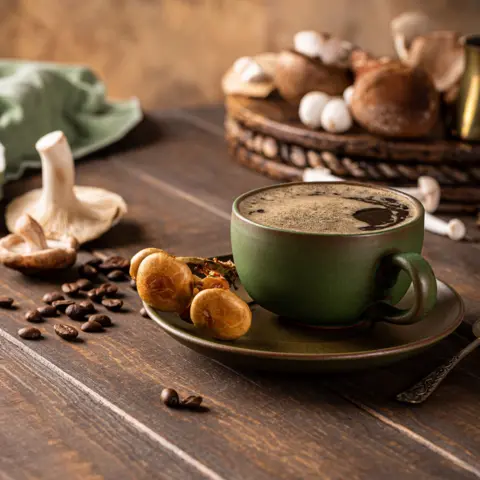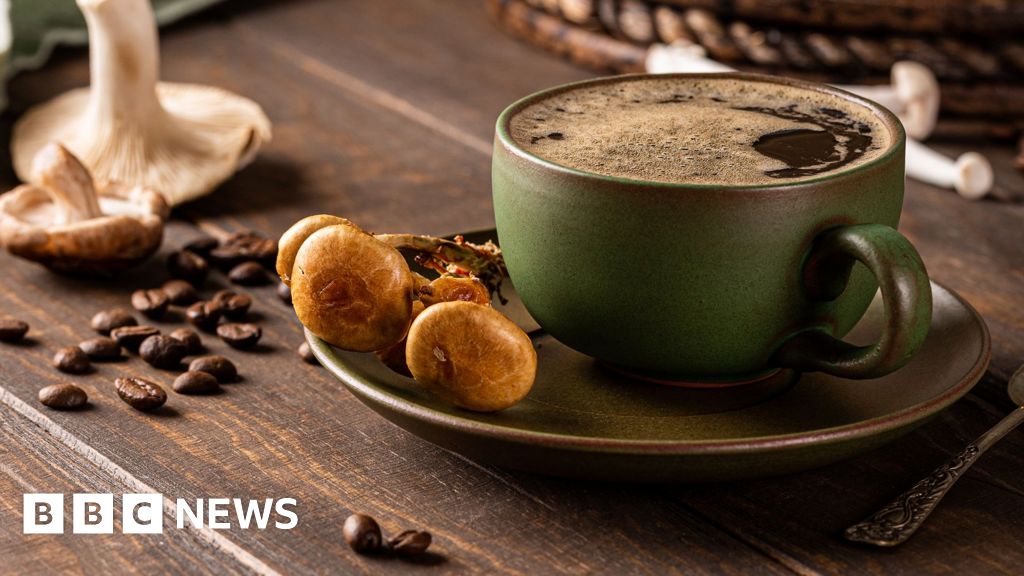 Getty Images
Getty ImagesZak Haddad has been kickstarting his day with a cup of coffee infused with lion’s mane – a type of mushroom – for the past three years.
He says it gives him a “really clear, focused feeling”, without the “spike and crash you can sometimes get from strong coffee”.
Coffees made with extra ingredients like mushrooms, protein and collagen are known as “functional coffees” – which aim to provide consumers with benefits beyond the typical caffeine boost.
For years they’ve been a familiar sight in the aisles of health food stores, but more recently they’ve been cropping up in high street coffee shops too.
So when Zak opened his own coffee shop – Sipp in Chorlton, Greater Manchester – in late 2023, he was eager to include mushroom coffees on the menu.
Zak’s shop has four different types of mushroom powder on its menu, which he says all have different benefits. Customers can pay an extra £1 to add a mushroom powder or a supplement called collagen to drinks from lattes to cappuccinos.
 Zak Haddad
Zak Haddad‘From niche wellness corners into the mainstream’
Coffee made with mushrooms, like lion’s mane, reishi and chaga, are believed to give people better focus “without the jitters of regular coffee”, according to nutritionist Eli Brecher, though she notes that research is still ongoing.
Over the past year as demand has risen, health food chain Holland and Barrett has almost doubled its range of mushroom coffees, it told the BBC.
Coffee giant Starbucks started selling barista-made protein coffee in its US stores in September, with high-protein milk and cold foam. In the UK, you can pick up a bottle of Starbucks’ pre-made protein coffee from the fridges at its coffee shops and in supermarkets, where it might be sold alongside chilled protein coffees by other brands such as Jimmy’s and Emmi.
Food research company Tastewise lists functional coffee as one of its top trends for 2026. It found the number of mushroom coffees on UK coffee shop menus has grown 30% over the past year.
“Functional coffees are shifting from niche wellness corners into the mainstream,” says Ms Brecher, who herself drinks mushroom coffee. She says people are becoming “much more interested in wellbeing, stress support and energy stability”, and that adding extra ingredients to a cup of coffee “feels like an easy upgrade, rather than an overhaul”.
 Rii Schroer
Rii SchroerThe Black Sheep Coffee chain has been offering scoops of protein powder and CBD as add-ons to its drinks for some time, but earlier this year, it launched its “functional health” latte range.
One, containing prebiotic fibres, aims to improve gut health. Another, with collagen, is meant to help people’s skin. But it’s the lion’s mane latte that is Black Sheep’s bestseller, according to Ben Fenton, their chief operating officer. And customer response to the drink has been “far beyond” what the company expected.
Customers add functional add-ons to about 15% of all coffee, matcha and smoothie orders from Black Sheep, he says.
Prices vary by location but at Black Sheep Coffee in Birmingham, adding a shot of lion’s mane to your coffee costs 99p, and a shot of collagen costs £1.09. So if you buy a functional coffee every day, rather than your regular one, over the course of a month you’ll spend about £30 more.
Meanwhile, in the US Starbucks customers are paying $1 (76p) to add high-protein milk or $2 (£1.52) to add high-protein cold foam to their coffee.
At Liverpool Street Station in London, not everyone I speak to seems enticed by the idea of paying extra for a functional coffee. And many say they haven’t come across the concept of coffees made with ingredients like mushrooms and ashwagandha – a herb some people think helps with stress – before.
Someone who is well-aware of the trend, however, is Mariam Begum.
Every day, the 31-year-old drinks coffee with a shot of collagen, a protein some people take in supplement form because they believe it will help their skin, joints and hair. And sometimes Mariam adds protein powder, too.
The self-described caffeine addict drinks three or four coffees a day. She’ll either make them at home with collagen she’s bought online or grab an iced coffee or flat white with collagen or protein from a coffee shop near where she lives in London.
Unlike Mariam, Lauren Devlin, a former competitive power-lifter, has never bought a functional coffee from a cafe, but says she would if she ever saw them on a menu – even if she had to pay more.
For years, she’s been drinking both coffee and protein shakes every day. But about five years ago, the 38-year-old started combining the two.
She now buys instant coffee containing collagen and protein powder online to make at home, which she says makes her “feel fuller” than a regular coffee.
 Lauren Devlin
Lauren DevlinSo how does functional coffee actually taste? I ordered a lion’s mane coffee with oat milk from Black Sheep, dubbed its “brain blend”, alongside a regular oat-milk latte.
Andrew Salter, cofounder of mushroom drinks brand Dirtea, says lion’s mane in particular has a subtle taste, and I found there was next to no difference between my functional coffee and the regular one. The mushroom latte was possibly slightly more bitter, but my perception may have been affected because I was expecting it to taste different. The texture and appearance of both coffees seemed identical.
There’s still a lot of confusion about the purpose of functional coffee – Mr Salter says when he set up his brand “99.9% of people asked if they were going to get high”. But the mushrooms used in coffees, like lion’s mane, are a different species to magic mushrooms and aren’t psychoactive.
 Grace Dean/BBC
Grace Dean/BBCSome who regularly drink functional coffees speak highly of their benefits.
Ana Richardson, who lives in Cardiff, says lion’s mane coffee made her feel like her brain “just started working” and it was easier to focus on one thing at a time after drinking it.
But the 29-year-old, who ordered lion’s mane online to add to coffees at home, found it expensive and switched to drinking lion’s mane tincture mixed into water instead.
Recently, Ana has also tried coffee with ashwagandha.
“I’m awake, but I’m not jittery,” she says of the drink. “I’m not anxious.”
‘An add-on, not a magic fix’
Research into the effect of lion’s mane’s on brain function is still in its early stages, but it is “promising”, according to nutritional therapist Rakhi Lad. But she notes most mushroom coffees on the high street use small quantities of lion’s mane, and that the quality can vary.
As for protein coffee, the general population “doesn’t really struggle” to get enough protein, says James Fleming, professor of sports nutrition at St Mary’s University. In general, only the elderly and professional athletes need to worry about adding extra protein to their diets, he explains.
The health benefits of functional coffees “vary quite a lot and for most people, they’re not essential,” says Bini Suresh, from the British Dietetics Association. Often the doses of functional ingredients in coffees “are too low to replicate the effects reported in research trials”, she adds.
“At present, there’s no robust evidence that lion’s mane in typical coffee doses can meaningfully improve memory, focus, or brain health.”
But the research is “still emerging”, says nutritionist Eli Brecher.
“So if it makes you feel good and you have the budget for it, then go ahead and enjoy,” she says. “But the key is to remember that it’s an add-on – not a magic fix.”

